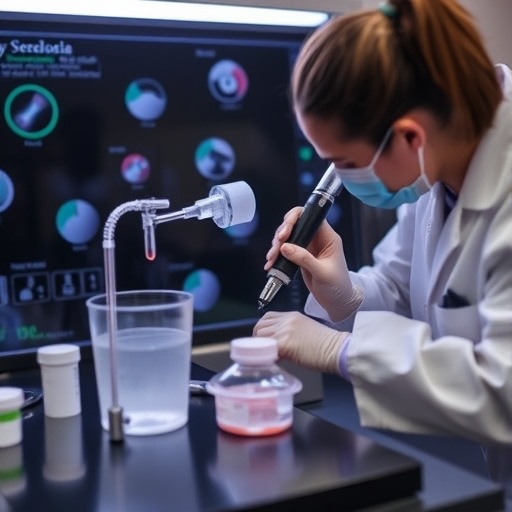The field of regenerative medicine is continuously evolving, driven by the potential of stem cells to repair and regenerate damaged tissues. Among the various stem cells that have garnered significant attention, mesenchymal stromal/stem cells (MSCs) play a pivotal role due to their ability to differentiate into a variety of cell types and their immunomodulatory properties. Recent research led by Mattei et al., published in the Journal of Translational Medicine, presents validated methodologies for the isolation and qualification of MSCs from diverse sources, marking a critical advancement in the application of these cells in clinical practice.
Isolating MSCs requires precise methods that ensure both the purity and functional viability of the cells. The study outlines several techniques to accomplish this objective, emphasizing the need for stringent protocols to maintain the biological integrity of the cells. For instance, physical separation methods such as density gradient centrifugation and differential adhesion techniques are highlighted for their effectiveness in isolating MSCs from heterogeneous populations of cells. These techniques rely on the different physical properties of cells, allowing for a more streamlined extraction of MSCs.
Chemical methods also play a crucial role in MSC isolation. The use of enzymatic digestion to dissociate tissues and facilitate the release of MSCs has become a standard practice. While employing enzymes like collagenase or trypsin, researchers must be cautious to optimize the conditions, as excessive enzyme exposure can negatively affect the viability of the isolated cells. Mattei et al. indicate that fine-tuning these enzymatic protocols can enhance cell yield and purity, enabling better downstream applications for the MSCs.
Furthermore, the research discusses the importance of culture conditions in the expansion and qualification of MSCs. The authors propose that the microenvironment in which MSCs are cultured significantly influences their functional characteristics. Factors such as the composition of the culture medium, the substrate used for cell attachment, and the physical parameters like oxygen tension and mechanical forces can all alter the behavior of these cells in vitro. By modifying these parameters, researchers can cultivate MSCs that are not only plentiful but also exhibit desirable traits for therapeutic applications.
Another critical aspect of the study is the qualification of MSCs, which goes beyond mere isolation. The authors emphasize the necessity of establishing standardized criteria for characterizing MSC populations to ensure their functionality and safety for therapeutic use. This includes the assessment of specific surface markers, differentiation potential, and overall cellular morphology. Through these qualifications, researchers can identify the most suitable MSC sources for various clinical applications, thus enhancing the translational aspects of this research.
Ethical considerations are crucial when working with stem cells. The acquisition of tissue used to isolate MSCs must comply with ethical guidelines and regulations. Mattei et al. stress the importance of transparency in sourcing materials, especially when derived from human tissues. Clear informed consent, adherence to ethical standards, and respect for donor rights are paramount for maintaining public trust and advancing research in this area.
Moreover, the implications of MSC therapy extend beyond mere regeneration. The immunomodulatory properties of these cells have the potential to revolutionize the treatment of autoimmune diseases, graft versus host disease, and even conditions like COVID-19. Studies have illustrated that MSCs can modulate immune responses, making them suitable candidates for cell-based therapies. The potential to harness MSCs as a treatment option opens a new frontier in managing a variety of diseases that were previously deemed challenging to address.
Despite the promising features of MSCs, there are challenges that remain to be solved. For instance, the heterogeneity of MSC populations is a significant hurdle. The variability in cell properties can impact therapeutic efficacy, emphasizing the need for robust characterization and validation methods, as discussed by Mattei et al. Addressing this variability through improved isolation and qualification techniques will be necessary to harness the full potential of MSCs in clinical settings.
The collaborative efforts of researchers in this field are vital. The study by Mattei et al. encourages a collaborative approach, bringing together experts from diverse fields to refine isolation protocols and develop standardized qualification methods. Such interdisciplinary cooperation will promote knowledge sharing and allow for the development of best practices, ultimately leading to better patient outcomes.
As the field of MSC research progresses, the implications of this work are immense. Enhanced methods for isolating and qualifying MSCs can facilitate not only scientific discovery but also numerous applications in regenerative medicine, offering hope to those with previously untreatable conditions. The advancements presented in this study lay the groundwork for future developments, leading to improved therapies that can potentially change the landscape of medicine.
In conclusion, the work of Mattei et al. represents a significant milestone in the ongoing quest to harness the power of mesenchymal stromal/stem cells. Through validated methodologies for isolation and qualification, the research underscores the importance of precision in stem cell research and therapy. As we move closer to translating these findings into clinical applications, it is essential to continue exploring the functionalities of MSCs and to uphold the highest standards in research practices. The ongoing endeavors in this domain will surely pave the way for innovative therapies that harness the innate regenerative potential of the body’s own cells.
Subject of Research: Mesenchymal stromal/stem cells isolation and qualification methods.
Article Title: Validated methods for isolation and qualification of mesenchymal stromal/stem cells from different sources.
Article References:
Mattei, V., Santilli, F., Pulcini, F. et al. Validated methods for isolation and qualification of mesenchymal stromal/stem cells from different sources. J Transl Med 23, 975 (2025). https://doi.org/10.1186/s12967-025-06972-8
Image Credits: AI Generated
DOI: 10.1186/s12967-025-06972-8
Keywords: Mesenchymal stromal/stem cells, isolation methods, qualification methods, regenerative medicine, immunomodulation, ethical considerations.




